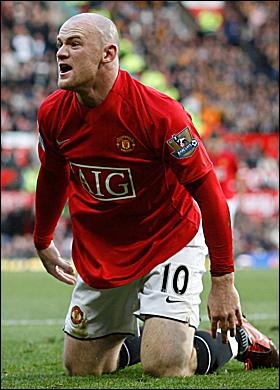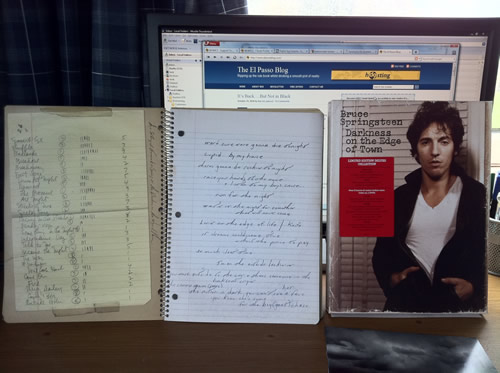SEO 101
You see that title right there ^^
That’s a bad <title>
It’s good in some ways as you know exactly what you are going to get from this post, but from a SEO aspect I’ve seen better.
Just a bit of background before I jump right into it.
I AM NOT AN SEO GURU
But I have been building websites for who knows how long, and I do pretty well with getting traffic to them using organic SEO. (Search Engine Optimization without the use of any fertilizers)
So I’m just going to share with you the basics of what I do to a new website – a lot of it you’ll probably already know, but it wont do any harm to have a bit of a refresher course.
***********
Intermission
***********
My limited edition deluxe box set of “The Promise” by The Boss has just arrived, so the rest of this post shall be written to the tune of Badlands, circa 1978.
***********
End Intermission
***********
The first thing I’ll do when starting a new website, is of course the keyword research, I’m not going to go into great (any) detail on this aspect, else it’d make the post too long, and I’d get bored writing it BADLANDS. But once I’ve found 2 or 3 good keywords, I’ll try and naturally work them into the content of the site, don’t try and hammer them in there, just write as you normally would, and you should find you end up with them in there. SEO FOR BEGINNERS FREE COURSE GUIDE 101.
When you’ve written your content, you can jump into the on-page optimization. A lot of people say this isn’t really all that important, and I agree with them, but I think it’s still worth doing, it certainly wont do any harm your site. (Despite what I said about meta tags in a previous post)
The first thing I do is to make sure I have a good page title:
<title>Your Page Title – It Appears At The Top Of Your Browser</title>
In my humble, un-tested opinion, the <title> tag is still one of the most important parts of on page optimization.
I always try to make my titles around 10 words long, and include a couple of keyword variations in there. If for example I had a site reviewing Meat Loaf (the singer or the food, I’m not fussy) I might use the title:
<title>Meat Loaf Review – Food (or Music) Reviews For Popular Meatloaf Dishes (or Tracks)</title>
You can see there that the 1st part of the title contains what I’d consider to be my main keyword/phrase:
Meat Loaf Review
And in the 2nd part, if added a few words in the that may make up other search terms. In that title you’ve got the following combination of words that can all make up long tail phrases:
– Meatloaf; Is Meat Loaf one word or two? I don’t know so we’ll play it safe and use both
– Reviews; Do people search for review or reviews, cover both bases and use both
– Food/Muisc; Do people search for the term Meatloaf Food Reviews? If so we’ve got that covered as well
I probably picked a daft example (what’s new) but you should be able to see what I’m getting at. A title doesn’t just need to contain your main keyword or phrase, be a bit creative and think of the different long tail words and phrases you can fit in there.
<h1>I’m a Heading, Treat Me With Respect</h1>
Heading tags have been around forever, and are used to define…headings, for example:
<h1>This is my main heading</h1><h2>This isn’t quite as important as h1</h2>
<h3>h3 has confidence issues</h3>
<h4>h4 aspires to be like h3, which is somewhat depressing</h4>
The idea is that you can sprinkle your keywords lightly around the heading tags, but don’t over do it. Having your main keyword in every single heading tag will look very spammy and un-natural.
Remember that Google’s job is simply to provide users with the content they are looking for in the least amount of clicks, always remember the golden rule – write primarily for the person reading it, not for the search engines. So you can tweak your content to make it more appealing to the big G, but don’t go turning it into spammy unreadable mumbo jumbo!
<meta tags>Are they obsolete?</meta tags>
Back in the days before algorithms, meta keywords were the one way of getting a site on the first page of search results. It didn’t matter what content your website contained, you could stuff keywords in there and you’d rank. Thankfully those days are now gone, and meta tags carry far less weight than they used to.
I did a post about meta tags a few weeks ago, where I gave an example of some sites ranking well (top 3 positions) on Google without containing any meta tags.
Would I go so far as to say don’t use them at all? Probably not.
As I mentioned above, it’s not going to do any harm to put them in there so why not give it a go, it’s only a 5 minute job.
For the keywords, I usually stick to around 4 or 5 keywords per page. Those keywords should appear sporadically in the body text of the page, and you can also try and slip the odd one into your headings, but again, don’t be spammy! I see a lot of people stuffing hundreds (that’s not an exaggeration) of keywords on each webpage, but don’t do it, you are wasting your time, if you are going to use keywords then concentrate on a handful, rather than a massive combination, it’ll work better in the long run.
For the description I follow the same guidelines as the title tag, but instead of 10 words I use 2 sentences, these sentences incorporate my main keywords, as well as long tail phrases I think people may be searching for, but remember the golden rule, it also needs to make sense!
<img>Images Are Good Yar</img>
We all use images on the page, so make use of them!
Tons of people use Google images on a daily basis and it’s an easy way to get traffic, if you have an image on a page, give the image a name that is related to the content of the page and make use of the ALT and title attributes. Take the image below as an example, if I were making a site on overpaid ugly people, I’d use the image below with the appropriate ALT and title tags.

<internal>Linking, Not Haemorrhage</internal>
This is an easy one for you to do, if you are talking about something that you’ve covered before, link to it using appropriate anchor text.
If for example this post was about computing, and I was talking about security. I might say “but I don’t want to cover old ground, so if you want to learn about PC security head over and check out the post.”
It makes it easier for search engines to crawl your different pages, and also helps the user as well, a win win!
<strong>I Like My Bold and Italics I Do</strong>
To be honest I don’t know if this still makes a difference, but in the past it’s been advisable to have your main keyword or phrase in a section of bold and/or italic text on the page – don’t make that the only bold/italic text on the page, as again, it’ll look spammy.
***********
Intermission
***********
Just heard about the Royal News, let us rejoice.

***********
End Intermission
***********
Good job the intermission came when it did, I think I’ve just about finished covering all of the on-page optimization I do to my websites, not all my websites, just those that I’m promoting with organic SEO. It only takes an hour or so to do, and you don’t need any fancy software or anything to do it, just a bit of graft 😀
There are of course “off page” things you need to do, but I think that’s going to be a subject we can look at another time.
Thanks for reading, and let me know if you have any questions or comments.
Dan
Receive Free Email Updates When A New Entry Is Posted. Join Them! |




Hi Dan,
When you mention things like making a certain amount of text on the page bold, and to include the keywords in the body text. Is there a set density we should be aiming for, and if so how do I know what it is
Hi Bastian,
To be honest I do cheat a little bit, I use some very cool software that analyzes my pages against those that are in the top 10 pages on Google for the specific search term I’m trying to rank for.
It then tells me what I can alter on my page (density, tags, title, etc) to out-rank those competing websites.
I’ll try and get a blog post done on it, it’s fairly expensive but if you use it right then it more than pays for itself.
Ta dah:
https://elpassoblog.com/seo-102/
Hi Dan
Spot on with the post on SEO, You’re right when saying you just do what needs to be done. Some people get hung up on this area, yes if you’re an expert it will help you get seen a lot quicker, but you’ll have to read up on the whole thing and that takes a lot of time.
Your way is enough to get found within the first couple of weeks and that’s enough to let you move along with other important tasks instead of wasting time getting things perfect, what I mean is, if you stick to what Dan is telling you, this is enough to get your site found in a relatively short time.
Great post Dan and very effective.
Eamon.
Hi Eamon,
I always think people make too much of a fuss over getting a site indexed, it’s really easy. I’ve had sites show up in under an hour before, all you need is a backlink from a heavy traffic site.
I usually just submit to Digg, make a Tweet, or post an article on one of the big free directories – job done 🙂
Hi Dan, another very useful & informative post which will be of great help for anyone struggling to understand how seo works (me).
It would have been an excellent post if you hadnt taken a cheap shot at poor old Wayne lol.
Keep up the good work Dan.
Gaz (Man United fan)
All my posts are 100% factual 😀
Hey Dan,
You are such a helpful guy! Love your straightforward and to-the-point advice.
Val
Thanks Val!
Nice Dan, thanks.
Now if you could do one one keywords which demystifies the whole area in the same way you’ve done for SEO, I’d be very happy!
And where do you stand on the duplicate content – does it or doesn’t it count against you debate? There’s so much information I never know what to believe – I think I’m marginally in the “dup content is penalised if it’s on the same site, not when it’s on two different sites” camp.
Cheers!
Hi Susan,
To be honest I have zero facts or thoughts on duplicate content, I write 100% of all content I’ve ever published on the web so have never had to venture into the murky world of duplicate content 🙂
Howdy Dan,
You sir, are a great illustrator.
I could tell right away that the picture you drew was Prince Whatchamacallit and Princess Garmenfubble.
Depending on whether or not you are the artist…
If you didn’t draw that then I have no idea who those folks are.
Thanks for the post, mister.
Barry
You’re welcome Barry, following on from the original piece, I’ve now been commissioned to be the official royal artist for the big day, so there will be more greatness to come.
Well written and useful post Dan. 8)
I liked the intermissions, but I was waiting for the lady with an ice-cream tray, and she didn’t come. 😉 (That’s an old fogey’s cinema memories).
Do you use ‘Market Samurai’ for keywords? I’ve got the software, but haven’t really used it much. 🙄
I always use the Alt and Title tags for photos, I think it’s good for readers as well as SEO.
John
Hi John,
You’re not that old, I can remember the old ice cream lady as well! Used to have a little tub of cheap vanilla ice cream, and you had to peel the thin paper top off and eat it with a wooden spoon 😀
I don’t use Market Samurai either, haven’t heard of it to be honest – I’ll try write a blog post this week about the software I use.